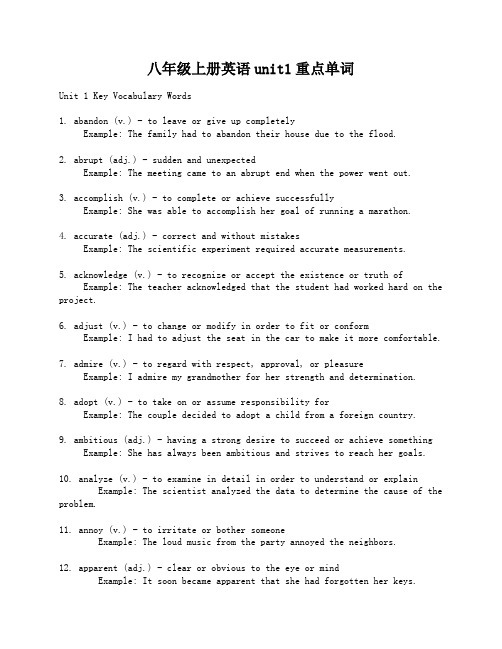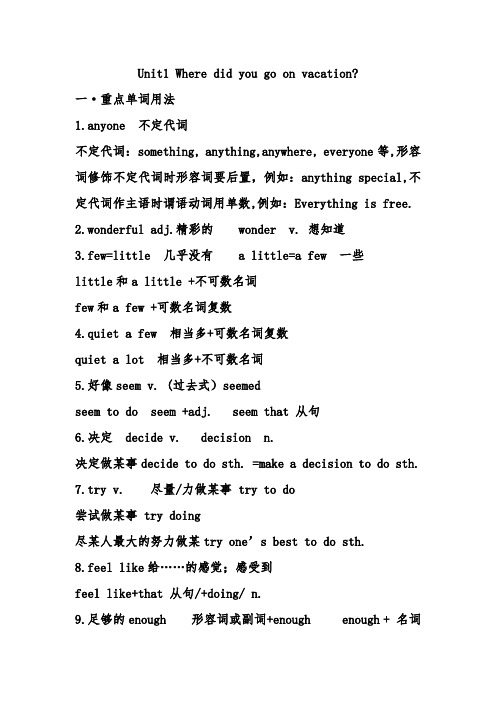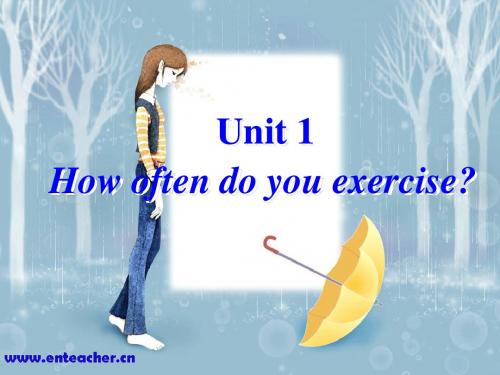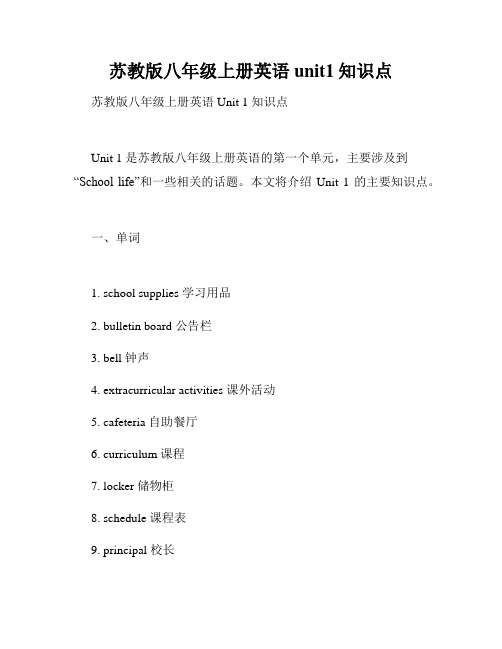八年级上册U1&U2必备短语与固定搭配
英语人教版八年级上unit1知识点笔记

Un i t 1 Wh e re d id yo u g o on v acation?1•一般过去时考点1:如何判断一般过去时?考点2:肯定句变否定句。
考点3:变一般疑问和特殊疑问句。
2•复合不定代词/副词构成: _________ _________ ___________ _________其中:(no one意思“______ ”指 __ ,与_________ 同义,且与of连用,做主语谓语用单三。
回答引起的特殊疑问句时要用no one.none意思“ ___ ”,指____________ ,且 __ 与of连用。
谓语单,复形式皆可。
回答 _________ 引起的特殊疑问句时要用none;-anyone意思" _____ ”扌旨___ ,与 __ 同义,且_____ 与of连用。
_any one 意思" ____ ”扌旨___ ,与 __ 同义,且_____ 与of 连用。
nothing= _________________用法:① 复合不定代词做主语,谓语动词用 ________ •②当adj.修饰不定代词要_________ •③ 当不定代词中含有some通常用于__________ ;含有any通常用于_______________我自己myself你自己他自己她自己它自己我们自己你们自己他们自己反身代词在句中可用作动词宾语、介词宾语、表语和同位语等,如:She can dress herself.作动词宾语)That?poor?boy?was?myself.(用作表语)Thefatherhimselfhassomething wrong.(同位语:句中常置于名词、代词之后或句子末尾We clean the room ourselves.(同位语:句中常置于名词、代词之后或句子末尾常用短语:穿衣服;?玩得快乐;随便吃;随便用;2.few 意为___________,修饰__________ 名词,倾向于否定。
八年级上册英语u1语法知识点

八年级上册英语u1语法知识点英语语法对于学习英语而言是非常重要的一部分,尤其是对于初中学生来说,掌握语法知识点是很有必要的。
本文将重点介绍八年级上册英语U1中的一些常用语法知识点,帮助大家更好地学习英语。
一、动词时态动词时态是英语语法中最基本也是最常用的部分,对于初学者来说掌握好动词时态是至关重要的。
在U1中,出现了以下几种时态:一般现在时、一般过去时、现在进行时。
这里我们分别来介绍一下。
1. 一般现在时一般现在时表示的是现在的状态或习惯动作,通常使用“主语+谓语动词的原形”构成,如:- I play basketball with my friends after school.(我放学后和我的朋友们打篮球。
)- She usually goes to school by bus.(她通常乘公交车去上学。
)2. 一般过去时一般过去时表示过去的状态或动作,通常使用“主语+谓语动词的过去式”构成,如:- Yesterday, I went to the park with my family.(昨天,我和我的家人去了公园。
)- He studied hard for the exam last night.(他昨晚为考试努力学习。
)3. 现在进行时现在进行时表示现在正在进行的动作,通常使用“主语+be动词+现在分词”构成,如:- They are playing basketball on the playground.(他们正在操场上打篮球。
)- I am studying for the English test now.(我正在准备英语考试。
)二、情态动词情态动词在英语语法中也是比较重要的一部分,它是用来表示说话者对某一行为的态度、意愿或可能性的动词。
在U1中,主要涉及到以下几个情态动词:can、could、may、might、must、should、would。
这里我们分别来介绍一下。
1. can和couldcan和could都表示能力和可能性。
八年级上册英语unit1重点单词

八年级上册英语unit1重点单词Unit 1 Key Vocabulary Words1. abandon (v.) - to leave or give up completelyExample: The family had to abandon their house due to the flood.2. abrupt (adj.) - sudden and unexpectedExample: The meeting came to an abrupt end when the power went out.3. accomplish (v.) - to complete or achieve successfullyExample: She was able to accomplish her goal of running a marathon.4. accurate (adj.) - correct and without mistakesExample: The scientific experiment required accurate measurements.5. acknowledge (v.) - to recognize or accept the existence or truth ofExample: The teacher acknowledged that the student had worked hard on the project.6. adjust (v.) - to change or modify in order to fit or conformExample: I had to adjust the seat in the car to make it more comfortable.7. admire (v.) - to regard with respect, approval, or pleasureExample: I admire my grandmother for her strength and determination.8. adopt (v.) - to take on or assume responsibility forExample: The couple decided to adopt a child from a foreign country.9. ambitious (adj.) - having a strong desire to succeed or achieve somethingExample: She has always been ambitious and strives to reach her goals.10. analyze (v.) - to examine in detail in order to understand or explainExample: The scientist analyzed the data to determine the cause of the problem.11. annoy (v.) - to irritate or bother someoneExample: The loud music from the party annoyed the neighbors.12. apparent (adj.) - clear or obvious to the eye or mindExample: It soon became apparent that she had forgotten her keys.13. approach (v.) - to come near or closer to something or someoneExample: We approached the house cautiously, unsure of what we would find inside.14. appropriate (adj.) - suitable or proper in the circumstancesExample: It is important to wear appropriate clothing for a job interview.15. approve (v.) - to officially agree or accept somethingExample: The committee approved the new budget proposal.16. argue (v.) - to give reasons or evidence in support of an idea or beliefExample: The students argued their case for having longer lunch breaks.17. arrogant (adj.) - having an exaggerated sense of one's own importance or abilitiesExample: His arrogant behavior made it difficult for others to work with him.18. artificial (adj.) - made or produced by human beings rather than occurring naturallyExample: The flowers in the vase were beautiful, but they were artificial.19. assistance (n.) - help or support provided to someoneExample: The school offered tutoring as an assistance to struggling students.20. assure (v.) - to inform or tell someone confidently or positivelyExample: The doctor assured the patient that the test results were normal.21. attach (v.) - to connect or join something to something elseExample: She attached a photo to her email for added context.22. attribute (v.) - to say that a quality, action, or state is caused by a particular person or thingExample: The artist attributes her success to years of hard work and dedication.23. aware (adj.) - knowing that something exists or is happening; having knowledge or recognition ofExample: The community became aware of the environmental issues affecting their area.24. benefit (v.) - to be helpful or advantageous to someone or somethingExample: Eating a healthy diet can benefit your overall well-being.25. belong (v.) - to be a part of a group, organization, or familyExample: This book belongs to the school library.26. bias (n.) - a preference or an inclination for or against someone or somethingExample: The study had a bias towards the new treatment due to the researcher's interest.27. beside (prep.) - next to or alongside something or someoneExample: She sat beside her friend during the movie.28. beneath (prep.) - under or below somethingExample: The treasure was hidden beneath the floorboards.29. besides (adv.) - in addition to; apart fromExample: Besides English, she also speaks Spanish and French.30. bias (v.) - to show a preference or an inclination for or against someone or somethingExample: The media outlet was biased in its reporting of the political event.31. bind (v.) - to attach or fasten somethingExample: The thread binds the edges of the book.32. both (adj./pron.) - applied to two people or things and indicating that they are equally includedExample: Both students received the highest award for their achievements.33. brief (adj./v.) - short and concise; to give a short summary or explanation of somethingExample: The lawyer gave a brief summary of the case to the jury.34. bright (adj.) - having a high degree of light or color; intelligent or talentedExample: The student's bright ideas helped solve the complex problem. 35. bring (v.) - to take or come to a particular place with someone or somethingExample: She brought her dog to the park for a walk.36. broad (adj.) - large in extent or range; not limited or restrictedExample: The conference covered a broad range of topics related to education.37. build (v.) - to construct or create somethingExample: The construction workers built a new school building.38. bureau (n.) - a government department or agencyExample: The FBI is the bureau responsible for investigating federal crimes.39. busy (adj.) - engaged in activity; having a lot of things to doExample: She is too busy with work to attend the event.40. capable (adj.) - having the ability to do something wellExample: The chef is capable of creating delicious dishes.。
(完整版)八年级上册U1知识点

Unit1 Where did you go on vacation?一·重点单词用法1.anyone 不定代词不定代词:something, anything,anywhere, everyone等,形容词修饰不定代词时形容词要后置,例如:anything special,不定代词作主语时谓语动词用单数,例如:Everything is free.2.wonderful adj.精彩的 wonder v. 想知道3.few=little 几乎没有 a little=a few 一些little和a little +不可数名词few和a few +可数名词复数4.quiet a few 相当多+可数名词复数quiet a lot 相当多+不可数名词5.好像seem v. (过去式)seemedseem to do seem +adj. seem that 从句6.决定 decide v. decision n.决定做某事decide to do sth. =make a decision to do sth.7.try v. 尽量/力做某事 try to do尝试做某事 try doing尽某人最大的努力做某try one’s best to do sth.8.feel like给……的感觉;感受到feel like+that 从句/+doing/ n.9.足够的enough 形容词或副词+enough enough + 名词10.不喜欢 dislike v. 同义词:hate 反义词:like/love不喜欢做某事 dislike doing sth.二.课文中的重点1.做某事很有乐趣have fun (doing sth.) = have a good time( doing sth.)=enjoy oneself (doing sth.)他们每天打排球很有乐趣。
They have fun playing basketball every day.=They have a good time playing basketball every day.=They enjoy themselves playing basketball every day. 2.到达。
(完整版)人教版八年级上册英语unit1知识点及习题

Unit1 Where did you go on vacation一、书本重要语法点梳理go on vacation去度假 stay at home待在家里go to the mountains去爬山 go to the beach去海滩visit museums 参观博物馆 go to summer camp去参观夏令营quite a few相当多 study for为……而学习go out出去most of the time大部分时间taste good尝起来很好吃 have a good time玩得高兴]of course当然feel like给……的感觉;感受到go shopping去购物in the past在过去walk around四处走走because of因为one bowl of…一碗…… the next day第二天drink tea喝茶find out找出;查明go on继续 take photos照相something important重要的事 up and down上上下下come up出来buy sth. for sb. / buy sb. sth.为某人买某物taste + adj. 尝起来…… look+adj. 看起来……nothing…but+动词原形除了……之外什么都没有seem+(to be)+ adj. 看起来……arrive in+大地点 / arrive at+小地点到达某地decide to do sth.决定去做某事try doing sth.尝试做某事 try to do sth.尽力去做某事forget doing sth.忘记做过某事 forget to do sth.忘记做某事enjoy doing sth.喜欢做某事 want to do sth.想去做某事start doing sth.开始做某事 stop doing sth. 停止做某事dislike doing sth. 不喜欢做某事keep doing sth.继续做某事Why not do. sth.为什么不做……呢so+adj.+that+从句如此……以至于……tell sb. (not) to do sth. 告诉某人(不要)做某事1. on vacation 度假vacation意为“假期、假日”,相当于holiday,但vacation 表示长的假期。
(完整版)新人教版八年级英语上册unit1知识点总结

Unit 1 where did you go on vacation ➢单词复习:任何人Anywhere 精彩的;极好的最多的;大多数的没有什么n.没有。
每人;人人.我自己你自己;你亲自hen pig似乎;好像无聊的;厌烦的;郁闷的Someone Diary 活动;活跃。
决定;选定Paragliding bird bicycle building trader惊奇;想知道;怀疑差异;不同顶部;顶等;等待湿的;雨天的低于;在。
..下面饥饿的;渴望的如同;像.。
一样HillDuck不喜欢;厌恶短语归纳1、go on vacation去度假 ,2、stay at home 呆在家,3、go to the mountains 上山/进山,4、go to the beach到海边去,5、visit museums 参观博物馆,6、go to summer camp 去夏令营,7、quite a few 相当多,8、study for为……学习,9、go out 出去,10、most of the time 大部分时间/绝大多数时间,11、taste good 尝起来味道好,12、have a good time玩的开心,13、of course当然可以,14、feel like(doing sth)感觉像……/想要,15、go shopping购物,16、in the past 在过去,17、walk around绕……走,18、too many 太多(可数名词前面),19、because of 因为,20、one bowl of 一碗……,21、find out 查出来/发现,22、go on继续,23、take photos 照相,24、something important重要的事情,25、up and down上上下下,26、come up出来➢习惯用法、搭配1. buy sth。
for sb.=buy sb. sth。
八年级英语上册Unit1课件

Girl 2 : I often go skateboarding. Boy 2 : And I sometimes watch TV. Reporter: How about you? Girl 3: I hardly ever watch TV. I love reading. Reporter: Oh, why is that? Girl 3: Oh, I don't know. I guess I just like books.
Fill in the blanks with the information in the “Activity Survey” and “Vocabulary Key”.
Green high school: Activity Survey Activity Everyday Once or Three or twice a four times week a week Exercise 15% 10% 75% Do 95% 0% 5% homework Watch TV 85% 2% 13%
He is often late for school. 他上学经常迟到。
(4)sometimes的频度为20%左右, 意为“有时”,表示动作偶尔发生。 可以位于句首,以示强调。例如:
It is sometimes hot and sometimes cold. 天气忽冷忽热。 Sometimes he does it this way and sometimes he does it that way. 他有时这样做,有时那样做。
Reporter:How often do you exercise? Cheng :Oh,I exercise about three times a week. Reporter:How often do you shop? Cheng :Shop? I shop about ... about twice a monte?
苏教版八年级上册英语unit1知识点

苏教版八年级上册英语unit1知识点苏教版八年级上册英语Unit 1 知识点Unit 1 是苏教版八年级上册英语的第一个单元,主要涉及到“School life”和一些相关的话题。
本文将介绍Unit 1 的主要知识点。
一、单词1. school supplies 学习用品2. bulletin board 公告栏3. bell 钟声4. extracurricular activities 课外活动5. cafeteria 自助餐厅6. curriculum 课程7. locker 储物柜8. schedule 课程表9. principal 校长10. student council 学生会二、短语1. go to school 上学2. have classes 上课3. study hard 努力学习4. take notes 记笔记5. join a club 参加俱乐部6. play sports 运动7. eat lunch 吃午饭8. make friends 交朋友9. do homework 做作业10. get good grades 取得好成绩三、语法1. 一般现在时一般现在时表示经常性或习惯性的行为,以及真理和事实。
例如:I go to school every day.(我每天上学)2. 物主代词物主代词用来表示所属关系。
例如:This is my book.(这是我的书)3. 不定冠词不定冠词指代未被确定的人或物。
例如:I have a pen.(我有一支笔)4. 介词 ofof 用来表示所属关系或从属关系。
例如:The name of the school is Lincoln Middle School.(这个学校的名字是林肯中学)四、对话本单元的对话主要围绕 School life 展开,包括上课、吃饭、课外活动等。
例如:A: Hi, Tom. What do you have first period?B: Hi, Li. I have English. What about you?A: I have math. Do you like English?B: Yes, it's my favorite subject. Do you like math?A: No, I don't like it at all. But I have to study hard for the test tomorrow.B: Good luck with that.五、阅读本单元的阅读材料包括一篇有关“校园活动”的文章,以及一个有关校规的表格,并要求学生根据表格内容写一篇短文。
- 1、下载文档前请自行甄别文档内容的完整性,平台不提供额外的编辑、内容补充、找答案等附加服务。
- 2、"仅部分预览"的文档,不可在线预览部分如存在完整性等问题,可反馈申请退款(可完整预览的文档不适用该条件!)。
- 3、如文档侵犯您的权益,请联系客服反馈,我们会尽快为您处理(人工客服工作时间:9:00-18:30)。
12. The number of + 名词复数 is ……….. 13. A + be + as +形容词原级+ as + B A 和 B 一样……….
八年级上 U1-U2 期中复习
Tonghe Hu Zhoulai
Unit1 Encyclopedias 必背知识点 一、必备短语归纳
1. be born 出生 2. in the countryside 在农村 3. for example 例如 4. more than 多于【同】over【反】less than 5. human being 人类 6. die out 灭绝 11. be famous for 以......而闻名 12. some...others...一些......一些...... 13. how long 多长时间 14. find out 了解;弄清 15. would like to do 想要做……. 16. next to 紧挨着,在......旁边 17. go for a walk 去散步=take a walk 18. look like 看起来像 19. take photos of 给......拍照
7. come out of 从......出来 8. at the end of 在…….结尾 9. just like 正如;正像 10. Something important 重要的事
二、用法集萃
1. learn to do sth 学习做某事 许多......
2. many+名词复数
3. like to do sth/like doing 喜欢做某事 4. used to do sth 过去常常做某事 5. help sb. do sth. 帮助某人做某事 6. remember to do sth.记得要做某事 7. so much+不可数名词 如此多的......
3
6. make+宾语+形容词
7. the number of +可数名词复数 8. begin to do sth 开始做某事
三、语法项目:数词
2
八年级上 U1-U2 期中复习
Tonghe Hu Zhoulai
1、分类:基数词和序数词。 2:概念:
基数词: 序数词: 表示数目多少的数词; 表示顺序的数词;
15. copy down 抄写,誊写 16. traffic accidents 交通事故 17. the amount of ......的数量 18. at first 起初
7. look at 看...... 8. take...to... 带......去......
9. in a year 一年后 10. from then on 从那以后
3. 基数词变序数词 记忆口诀(重点 一定要记住) 基变序,有规律。一、二、三,特殊记,词尾字母 t, d, d. (first, second, third)。 八去 t, 九去 e,(eighth, ninth), f 要将 ve 替,然后再加 th(twelfth,fifth). 单词 ty 作结尾,ty 变成 tie, 然后再加 th. (twentieth, thirtieth, fortieth) 若是碰到几十几,只变个位就可以。 (twenty-first)
1
八年级上 U1-U2 期中复习
Tonghe Hu Zhoulai
Unit 2 Numbers 必背知识点 一、必备短语归纳
1. play chess 下国际象棋 2. a long time ago 很早以前 3. challenge...to...向(某人)挑战 4. would like 想要 5. and so on ......等等 6. talk to 和......交谈 11. not... any more 不再 12. all year round 一年到头 13. take place 14. both...and... 发生 ......和......都
19. in this way 用这种方式 20. so that 为的是,以便
二、用法集萃
1. order sb. to sth 命令某人做某事 一点....../没有……
2. a little/little+ 不可数名词
3. use sth.to do sth 用某物做某事 4. promise to do sth 许诺做某事 5. love to do sth 喜欢做某事 使某人、某物...... is ......的数量
